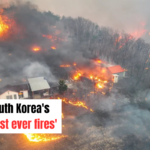Trump UK Trade Uncertainty: New Tariffs Shake British Economy
The phrase “Trump UK trade uncertainty” is now echoing throughout Westminster. As Donald Trump resumes power in the White House, the UK must quickly adjust to the changing global climate. Within hours of Chancellor Rachel Reeves presenting the Spring Statement, new challenges emerged, highlighting just how unstable global conditions have become.
UK Export Industry Faces Tariff Pressure
Trump’s recent 25% tariff on all imported cars has caused alarm. The move directly affects UK carmakers, who rely heavily on access to the American market. The United States ranks as the UK’s second-largest car export destination, just behind the EU. Because of the tariff, British cars may become too expensive to compete in the U.S.
Many manufacturers fear job losses, reduced revenue, and long-term damage to the industry. As a result, pressure is growing on the UK government to respond.
Learn more from SMMT’s latest auto trade stats and UK government export policy.
Government Response to Trump’s Trade Policies
During her Spring Statement, Rachel Reeves signaled that the government would rethink spending priorities. She referred to a “changed world” and acknowledged how external factors, like Trump’s trade approach, demand fresh strategies.
In Parliament, lawmakers from all parties are urging fast action. Some propose rebuilding trade ties with the EU, while others call for domestic investment to protect key sectors.
Read the Spring Statement 2025 summary or explore how UK trade policy is evolving.
How Trump UK Trade Uncertainty Signals a Global Shift
The Trump UK trade uncertainty reflects more than just one tariff. It marks a shift in global alliances and economic priorities. For the UK, this means preparing for less predictable policies from a country long seen as a close ally.
Furthermore, there are concerns about ripple effects across other sectors, such as defense and technology. Many experts warn this may be the beginning of a larger realignment in international cooperation.
For global perspectives, visit the BBC’s trade coverage or The Economist’s global economy section.
So far, the UK government’s approach has been one of cautious diplomacy—opting for private negotiations while avoiding public confrontation with Trump, wary of provoking his well-known volatility. Behind closed doors, officials have been working tirelessly to secure a UK-US trade deal that could provide some buffer against these sudden economic shifts. However, this situation highlights a broader challenge: uncertainty has become the new certainty in international relations, forcing UK leaders to constantly anticipate and react to potential upheavals.
The Office for Budget Responsibility (OBR), the independent forecaster, has attempted to predict the impact of these changes, though it acknowledges the difficulty of making economic projections in such an unpredictable landscape. Its latest report examines possible outcomes if the US raises tariffs by 20 percentage points, including scenarios where other countries, including the UK, retaliate. The worst-case scenario—where global trading partners reciprocate with their own tariffs—could severely impact the UK’s fiscal plans, undoing the careful economic balancing act that Reeves has been managing.

With Trump’s self-proclaimed “Liberation Day” just around the corner—when a fresh wave of tariffs is expected to be announced—intensive negotiations between the UK and US are in full swing. Reeves has confirmed that talks are ongoing to address tariffs on cars, steel, and other key sectors, stressing that the UK is keen to avoid a full-scale trade war.
As the world continues to evolve unpredictably, UK policymakers remain in a reactive stance, trying to mitigate the fallout of Trump’s economic maneuvers while keeping the country’s financial stability intact.
As Trump reasserts his influence on global trade, the UK must act quickly. With exports under threat and uncertainty rising, leaders are under pressure to adapt. The next few months will be critical for both British industry and foreign policy.




